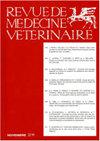智利bio - bio动物福利工厂工人刚地弓形虫血清流行率及相关危险因素
Q2 Veterinary
引用次数: 2
摘要
弓形虫病是一种由刚地弓形虫引起的世界性人畜共患病。刚地弓形虫是一种原生动物,其最终宿主是猫,其中包括家猫,可将感染传播给人类。在智利,没有发表过关于职业风险人群血清患病率的研究。因此,本研究旨在确定在Bio-Bio(智利)一家屠宰场的操作人员中刚地弓形虫的血清阳性率和相关危险因素。收集39例操作者的血清样本,采用化学发光分析法检测IgG和IgM抗体,其敏感性和特异性分别为93%和96%。进行流行病学调查,计算比值比,分析卫生、食品、暴露等变量。有证据表明,24人血清中IgG抗体的表观阳性率为61.5%,而IgM抗体的表观阳性率为0%。此外,未使用口罩的操作人员(64%)和未对工作材料进行消毒的操作人员(100%)以及食用未煮熟肉类的操作人员(62.5%)的血清阳性率最高。暴露时间方面,10年以上人群血清阳性率为72.7%,每周暴露4 ~ 7天人群血清阳性率为62.2%。各分析变量差异均无统计学意义(p > 0.05)。研究得出结论,在Bio-Bio屠宰场有职业风险的工人中,弓形虫的血清阳性率很高。本文章由计算机程序翻译,如有差异,请以英文原文为准。
Seroprevalencia de Toxoplasma gondii y factores de riesgo asociados en operarios de una planta de beneficio animal del Bío-Bío, Chile
Toxoplasmosis is a worldwide zoonosis caused by Toxoplasma gondii , a protozoan whose definitive hosts are cats, among them domestic cat, which can transmit the infection to humans. In Chile, there are no published studies on seroprevalence in people with occupational risk. Thus, this study aimed to determine the seroprevalence of Toxoplasma gondii and associated risk factors in operators of a slaughter plant in Bio-Bio (Chile). Serum samples from 39 operators were collected and studied by chemiluminescence analysis in order to detect IgG and IgM antibodies, with a sensitivity and specificity of 93 and 96%, respectively. An epidemiological survey was conducted and odds ratio was calculated for the analysis of the variables of hygiene, food, and exposure. Evidence showed that 24 individuals had IgG antibodies for an apparent seroprevalence of 61.5%, while this was 0% for IgM. In addition, the highest seropositivity was observed in operators who did not use masks (64%) and did not disinfect the working material (100%), as well as in those who consumed undercooked meat (62.5%). Regarding exposure time, 72.7% was obtained for the group of more than 10 years, and 62.2% of seropositivity was found in those exposed between four and seven days a week. There were no significant differences for any of the analyzed variables (p > 0.05). The study concludes that there is a high seroprevalence of Toxoplasma gondii in workers with occupational risk at the Bio-Bio slaughter plant.
求助全文
通过发布文献求助,成功后即可免费获取论文全文。
去求助
来源期刊

Revue De Medecine Veterinaire
农林科学-兽医学
CiteScore
1.30
自引率
0.00%
发文量
0
审稿时长
18-36 weeks
期刊介绍:
The Revue de Médecine Vétérinaire publishes four kinds of text:
1) Scientific reviews on subjects related to veterinary and comparative medicine. Suggested length: 10 to 30 typed pages.
2) Original reports on fundamental or applied research. Suggested length: 10 to 15 typed pages.
3) Continuous education articles, that should be easily understandable by non-specialists. Suggested length: 10 to 15 typed pages.
4) Clinical reports. Suggested length: 5 to 15 typed pages.
The publication can be done in French language or English language.
For an article written in English by not english native speakers authors, the manuscript must be subjected by attesting that it was read again by an anglophone scientist or a scientific translator.
The authors must certify that the manuscript was not published or subjected for publication to another review.
The manuscript must be accompanied by a sheet signed by all the joint authors indicating their agreement for the tender of the manuscript.
The publication is free but a financial participation could be required for the photographs color. An estimate will be sent to collect the agreement of the authors.
 求助内容:
求助内容: 应助结果提醒方式:
应助结果提醒方式:


